If you like to boondock in far-off destinations, or you simply don’t want to be dependent on the power outlets at crowded RV campgrounds, having a solid RV solar battery charger installed on the roof of your motorhome is the ideal solution.
That way, you can charge your batteries and power electronics inside your rig. Plus, these systems will keep your precious batteries healthy.
While shopping for the best solar powered battery charger for RV might be intimidating due to the technicalities, we will make your buying experience as painless as possible.
Dive right into our handpicked list of the best solar panel for camper battery for extended off-grid stays; there’s something for everyone, regardless of your power demand or budget.
If you’re not familiar with this new technology, worry not, we also cover everything a beginner needs to know about camper solar battery charger to make an informed decision. Learn how a solar battery charger works, the different types, the criteria to go over, a list of prestigious suppliers and answers to frequently asked questions.
Contents
- What is a Solar Battery Chargers for RV?
- How Do RV Solar Battery Chargers Work?
- Types of Solar Battery Chargers for RV?
- What Are The Benefits of RV Solar Battery Chargers?
- Best RV Solar Battery Chargers: In-Depth Reviews
- How to Choose the Right RV Solar Battery Charger
- FAQs About RV Solar Battery Chargers
What is a Solar Battery Chargers for RV?
There are three ways to charge your RV battery: plug your rig into shore power at your home or at the campground, use an RV generator to top it off, and install solar panels on the roof of your motorhome to create electricity from sunlight.
This third method means you can still satisfy your power demand during extended off-grid stays with no power outlet or generator, as long as you get some sun.
Just like with residential applications, using solar powered battery charger for RV has become increasingly popular, especially for the full-time travelers.
In addition to its environmental friendliness, using an RV solar battery charger allows you to charge your rig’s battery as well as powering everything electrical inside your RV when you don’t have access to shore power, including the lights, A/C, water heater and appliances.
RV solar battery chargers are specialized devices that use solar energy to charge and maintain the batteries in recreational vehicles (RVs). They work by converting sunlight into electricity, which is then used to power the batteries. It serves as an eco-friendly and self-sufficient alternative to traditional methods of charging RV batteries, such as generators or plugging into shore power.
Comprising solar panels, a charge controller, and often an inverter, an RV solar battery charger system works by capturing sunlight through solar panels and converting it into direct current (DC) electricity. The charge controller manages the charging process by regulating the flow of electricity to prevent overcharging and ensure the batteries are charged optimally. Inverters, if included, convert the DC electricity into alternating current (AC) electricity, which can power appliances and devices within the RV.
Solar powered battery charger for RV are designed to be efficient, durable, and compact, making them suitable for the limited space available on RVs. They enable RV owners to tap into a renewable energy source, reducing their reliance on fossil fuels and external power sources while also saving on fuel costs and reducing noise pollution.
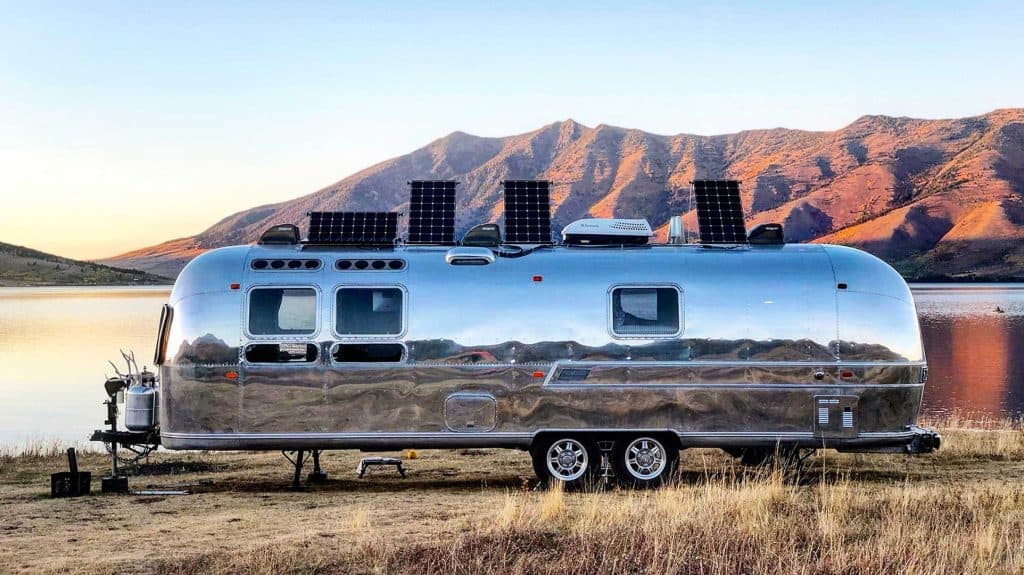
How Do RV Solar Battery Chargers Work?
An RV solar battery charger operates through a sophisticated process that harnesses solar energy and converts it into electricity to charge and maintain the batteries in recreational vehicles.
In short, they take advantage of the sun’s energy to provide a sustainable and renewable source of power for an RV’s electrical needs. This approach not only offers greater energy independence but also reduces environmental impact and operating costs over time.
Here’s a step-by-step breakdown of how it works:
Solar panels capture sunlight: The process begins with solar panels, also known as photovoltaic (PV) panels, mounted on the roof of the RV or in a location with optimal sun exposure. These panels are made up of individual solar cells that contain semiconductor materials. When sunlight strikes these cells, they generate an electric current through the photovoltaic effect.
Conversion of sunlight into DC electricity: The solar cells within the panels convert sunlight into direct current (DC) electricity. DC electricity consists of a continuous flow of electrons in one direction.
Routing electricity to charge controller: The generated DC electricity is then directed to a component called the charge controller. The charge controller plays a crucial role in managing the charging process. It regulates the amount of electricity flowing into the RV’s battery bank, preventing overcharging and ensuring that the batteries are charged safely and efficiently.
Battery charging: The charge controller sends the appropriate amount of DC electricity to the RV’s battery bank. The batteries store this energy for later use. As sunlight continues to strike the solar panels, the batteries continue to charge, gradually replenishing their energy levels.
Optional inverter for AC conversion: Some RV solar setups also include an inverter. If present, the inverter converts the stored DC electricity from the batteries into alternating current (AC) electricity. AC electricity is the type of electricity used to power most household appliances and devices.
Powering RV appliances: The AC electricity generated by the inverter can be used to power various appliances and devices within the RV, similar to the electricity provided by traditional shore power connections. This allows RV occupants to use lights, outlets, kitchen appliances, and other equipment using the energy stored in the batteries.
Monitoring and maintenance: Modern RV solar systems often include monitoring features that allow users to track the performance of the solar panels, the state of charge of the batteries, and the overall health of the system. Regular maintenance, such as cleaning the solar panels and ensuring all components are functioning correctly, helps optimize the system’s efficiency.
Types of Solar Battery Chargers for RV?
There are 3 main types of RV solar battery chargers available, each with its own characteristics, installation methods, and advantages.
Solar trickle chargers
Solar trickle chargers for RV are the most basic type of RV solar battery charger. They’re small, lightweight, and low-capacity solar panels designed to maintain the charge of your RV’s batteries over extended periods of inactivity. They are particularly useful when your RV is in storage or not in use for an extended period.
These RV solar trickle chargers provide a continuous low-level charge to prevent battery depletion and sulfation, a common issue in batteries left unused for long periods. Solar trickle chargers for RV battery are often portable and easy to set up. However, they are not intended to rapidly charge depleted batteries and are best suited for maintenance purposes.
Portable solar panel kits
Portable solar panel kits are a more powerful option than solar trickle chargers. Portable solar panel kits consist of foldable or compact solar panels that can be set up outside your RV to capture sunlight efficiently. These kits usually include solar panels, a charge controller, cables, and sometimes a storage bag. They offer a versatile solution for RVers who want the flexibility to position the panels for optimal sun exposure.
Portable RV solar battery charger kits come in various power outputs, allowing you to choose a size that matches your energy needs. They are ideal for those who prefer not to install permanent solar panels on their RV roofs or want the option to move the panels to avoid shading.
Full RV solar systems
Full RV solar systems are comprehensive setups that include roof-mounted solar panels, charge controllers, inverters (if desired), and the necessary wiring and components. These systems are designed to provide a substantial amount of power to meet the energy demands of the entire RV. Roof-mounted solar panels are permanently affixed to the RV’s roof, allowing for maximum sun exposure while driving or parked.
Full RV solar systems are capable of charging and maintaining the RV’s batteries, powering appliances, lights, and other electrical devices. They offer a high degree of energy independence and are suitable for RVers who frequently boondock or spend extended periods off-grid.
| Factor | Solar Trickle Chargers | Portable Solar Panel Kits | Full RV Solar Systems |
|---|---|---|---|
| Cost | Lowest | Medium | Highest |
| Power Output | Low | Medium | High |
| Portability | Low | High | Medium |
| Installation | Easy | Moderate | Difficult |
| Suitable for | Only for RV battery charging | RVs of all sizes | Large RVs, off-grid living |
What Are The Benefits of RV Solar Battery Chargers?
Opens up travel opportunities
A solar powered battery charger for RV makes you less dependent on the availability of power outlets at traditional campgrounds. You also won’t need to haul around that big and heavy generator.
This means you can travel to far off places off the beaten path but can still enjoy all the electrical creatures of comfort inside your motorhome while keeping your battery charged.
This also means that for the travelers who prioritize privacy, you can stay away from the busy and noisy campground packed with other motorhomes and enjoy nature to the fullest.
A long-term investment
If you’re still on the fence regarding the initial investment, remember that solar trickle charger for RV will be of good service to you for decades down the road. Solar panels have no mechanical moving parts that would wear out and need to be replaced.
When you’re no longer traveling and wish to sell your motorhome, the solar panels you have on the roof will undoubtedly increase the resale value of your RV.
Extends battery life
Continuous deep discharges would shorten the lifespan of the lead-acid batteries in your RV. Having a solid solar battery charger for RV properly installed would ensure that your battery gets topped off in a slow and steady manner at all times, which is ideal for lead acid batteries’ lifespan.
We all know that RV batteries are not cheap, not to mention that having a dead battery can leave you stranded in the middle of nowhere.
Furthermore, the best RV solar battery charger products on the market would have a charge controller in place, so you never have to worry about overcharging your precious battery.
Overcharging is undesirable, as it results in overheating, decreased charging efficiency and shortened battery life.
The charge controller makes sure that once the battery has reached a sufficient level of charge, the system would just supply the battery with the right amount of current to keep it at full charge, i.e. trickle charging.
This is why these systems are also called solar trickle charger for RV battery.
Quiet
While a generator is very noisy, these systems are perfectly quiet, so you can enjoy nature in peace and avoid disturbing wildlife.
Travel green
And of course, an apparent benefit of using solar battery chargers for RV is that you’re doing our planet earth a favor. Solar panels consume no fossil fuels and do not produce any harmful emissions. It is 100% clean and sustainable.
Safe
A solar powered battery charger for RV typically operates at less than 30 amps and at 12 volts, which means it’s inherently safe. The chance of electrical complications that can cause fire hazards or electrocution is negligible.
Cost
Solar panels are now used for many applications, so you can easily find them from many sources, both online and offline. You have many choices to create a customized solution for your camping needs. Plus, there are ample reviews and installation tutorial videos that you can rely on.
One solar panel typically costs you between $50 and $300, depending on the size, efficiency and durability of the panel. In general, the bigger the panel, the more energy it can produce at any given time to charge your RV’s battery and power it.
Best RV Solar Battery Chargers: In-Depth Reviews
Without further ado, below are the best RV solar battery charger kits on the market in terms of efficiency, power output, durability and value for money.
There is something for everyone, whether you just need an entry-level kit for minimal power consumption or a larger system to power up an oversized motorhome.
1. Topsolar 20W Solar Battery Charger
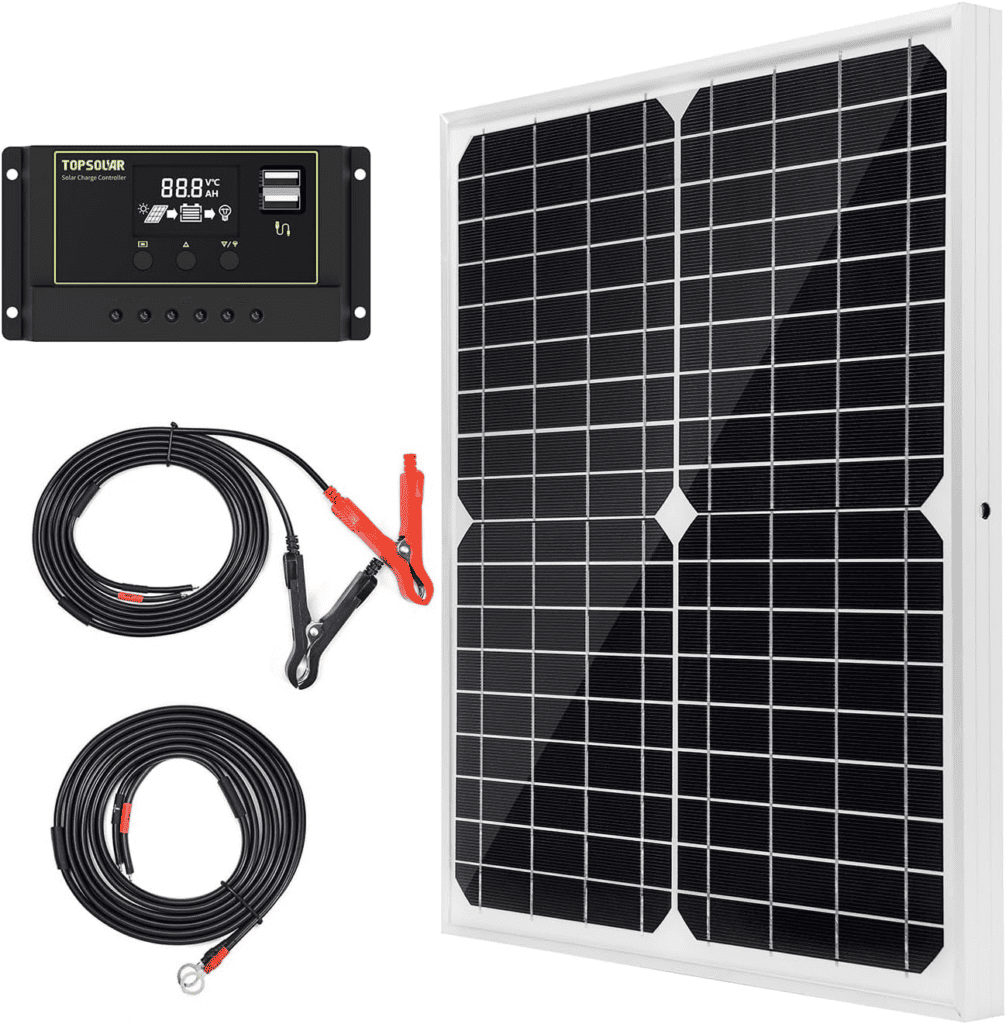
At a glance:
| Brand | Topsolar |
| Model | TOPSPM |
| Solar Cell Type | Polycrystalline |
| Maximum Power | 20W |
| Maximum System Voltage | 1000V DC |
| Optimum Operating Voltage (Vmp) | 18V |
| Optimum Operating Current (Imp) | 1.11A |
| Connector Type | USB |
| Material | Glass |
| Weight | 4.8 pounds |
| Dimensions | 18.9 x 13.4 x 0.7 inch |
| Warranty | 1 Year |
Why we love it:
The Topsolar 20W is a powerful and versatile solar battery charger that is perfect for off-grid power applications. It is designed to maintain 12 volt batteries in cars, RVs, and other vehicles, and it can also be used to power a variety of DC appliances.
One of the standout features of this kit is its 10A solar charger controller. This controller adds a layer of intelligence to the charging process, preventing the battery from overcharging, over-voltage, discharge, and short-circuit mishaps. It also has reversed polarity protection, which ensures that the battery is always safe from damage.
This Topsolar 20W solar battery charger also impresses me with its ability to efficiently harness the sun’s energy. The panels are designed to be tilted towards the sun, which can boost solar panel efficiency by up to 25% compared to laying them flat. This intelligent design ensures that you extract maximum power from the available sunlight, optimizing your charging capabilities.
The panels themselves are a testament to advanced technology and durability. Encased in multi-layered sheet laminations, they boast exceptional cell performance and a prolonged service life. With a robust tempered glass front and corrosion-resistant aluminum frame, these panels are built to withstand the test of time, even in outdoor environments. In fact, the combination of advanced materials and thoughtful construction means that these panels can potentially provide reliable service for decades.
In addition to their performance, the Topsolar Solar Panel Kit is designed for ease and convenience. The panels are compact and lightweight, making them easy to carry and transport. They also have pre-drilled holes on the back, making them quick and easy to mount using DIY brackets. This makes them a perfect companion for camping trips and outdoor activities.
Pros:
- Unmatched cell efficiency
- High power output
- Extra heavy duty construction
Cons:
- Some complaints about poorly written manual
2. SOLPERK 20W 12V Solar Battery Trickle Charger
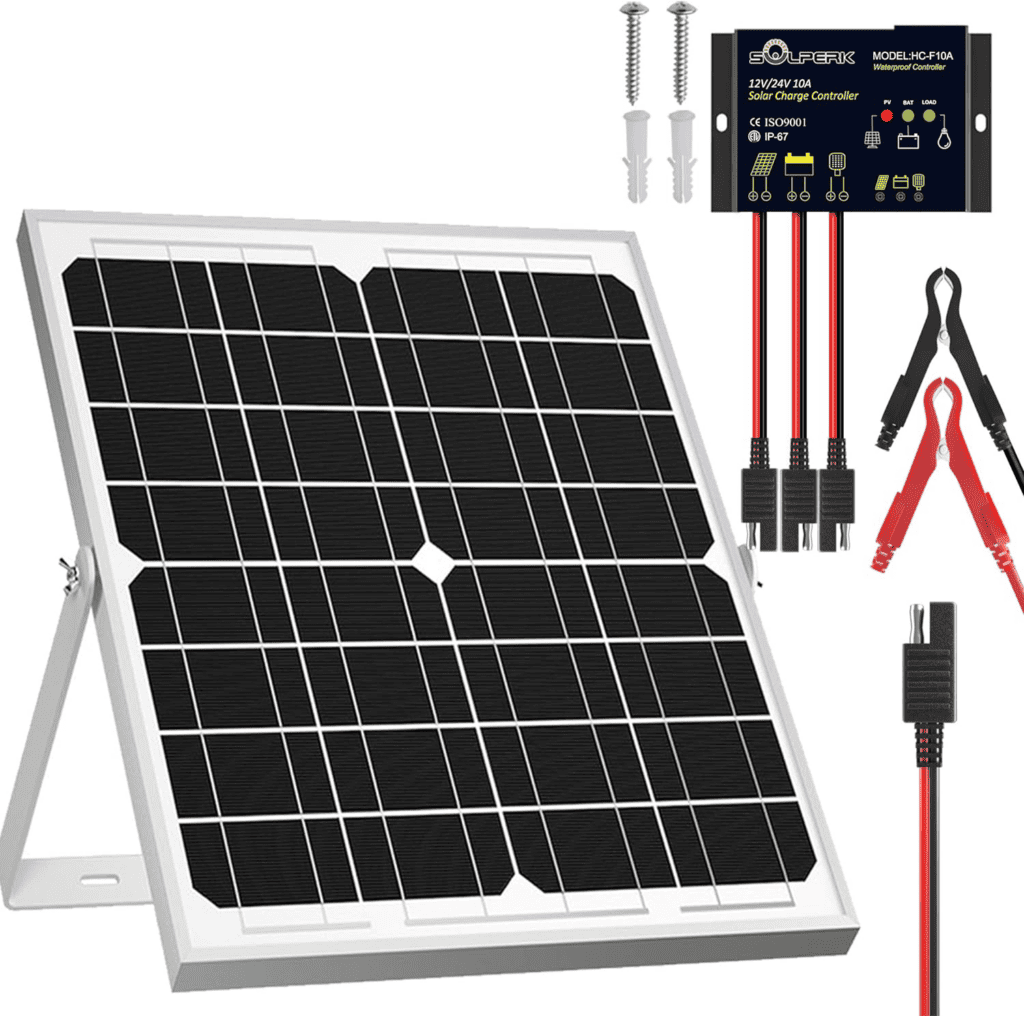
At a glance:
| Brand | SOLPERK |
| Model | FD-EP-230201-1688 |
| Solar Cell Type | Mono Crystalline |
| Maximum Power | 20W |
| Maximum Power Voltage | 18V |
| Maximum Power Current | 1.11A |
| Open Circuit Voltage | 21.6V |
| Efficiency | 21%-30% |
| Material | Aluminum, Monocrystalline Silicon |
| Charge Controller | 8A controller |
| Dimensions | 15 x 13.2 x 0.7 inches |
| Weight | 3 pounds |
| Mounting Stand | 360° adjustable |
| Warranty | 1 Year |
Why we love it:
If you are looking for a powerful, durable, and easy-to-use solar charger for your 12V rechargeable batteries, the SOLPERK 20W 12V Solar Battery Trickle Charger is a great option. It is the perfect solution for keeping your batteries charged and ready to use, no matter where you are.
The solar panel’s monocrystalline A+ solar cells are the driving force behind its remarkable performance. With an impressive cell efficiency ranging from 21% to 30%, this solar panel is highly efficient at generating power from the sun’s rays. This efficiency translates to effective charging and maintenance of 12V batteries, ensuring they stay ready to use whenever needed.
The SOLPERK 20W 12V Solar Battery Trickle Charger is equipped with an upgraded 8A controller that enhances its capabilities even further. The controller boasts charging efficiency that surpasses other controllers on the market, with a 20% to 30% higher efficiency. This ensures optimal energy conversion and maximizes the power harnessed from the sun. The controller also has an intelligent three-stage charging design that safeguards batteries from overcharging, over-voltage, and short circuits. This ensures the longevity of your batteries. Notably, the controller’s operation doesn’t siphon power from the battery, contributing to efficient energy management.
The solar panel is also built to last. It is encased in a durable aluminum frame and tempered glass, making it resistant to damage from the elements. It can withstand pressures as high as 2400Pa wind and 5400Pa snow load, making it perfect for use in even the harshest conditions.
The 360-degree angle adjustable mounting bracket is a valuable asset for anyone who wants to get the most out of their solar charger. It also ensures that your solar panels are always facing the sun, maximizing their efficiency.
Pros:
- Fully waterproof
- High power output
- High cell efficiency
- Heavy duty construction
Cons:
- Charge controller sometimes acts up
3. Eco-Worthy AM-P20X-CB-1 Waterproof 25W Solar Panel
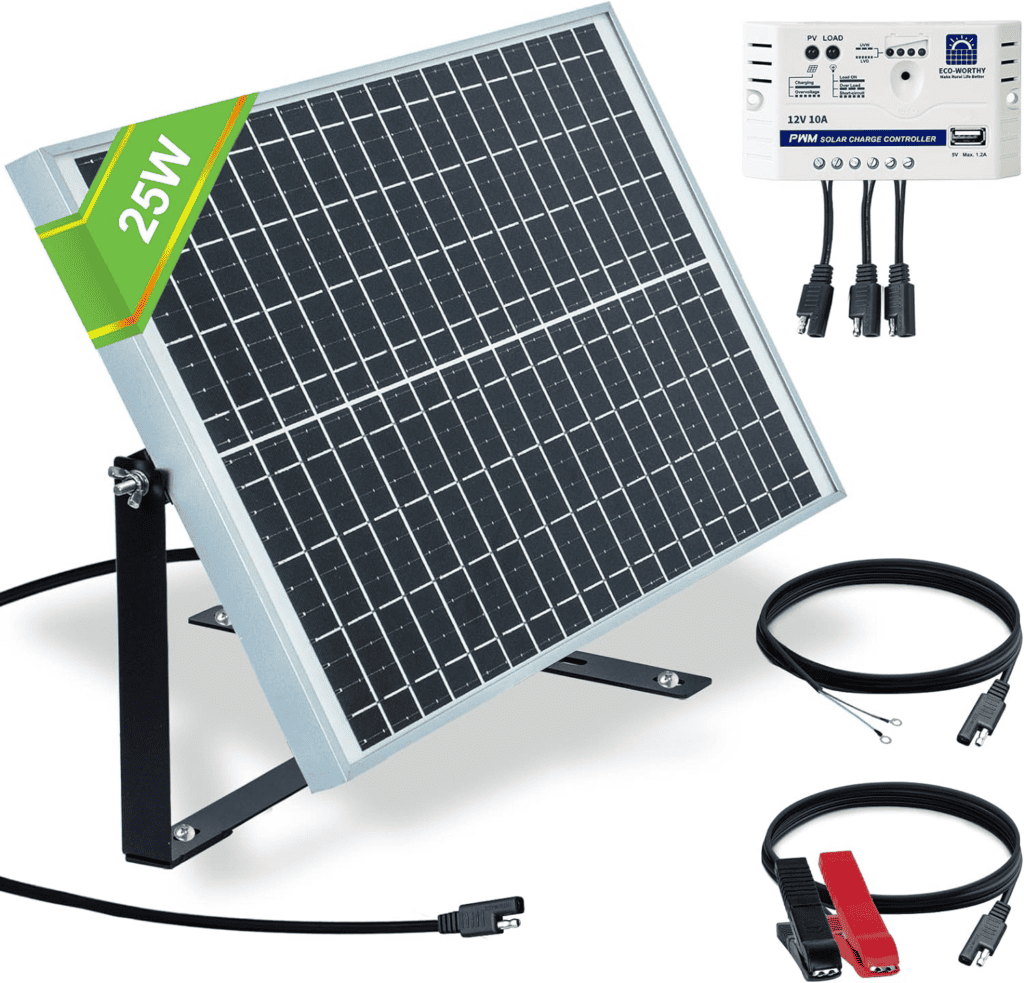
At a glance:
| Brand | ECO-WORTHY |
| Model | L02M10-CB-1 |
| Material | Aluminum |
| Connector Type | USB |
| Maximum Power | 25W |
| Maximum Voltage (Vmp) | 18V |
| Open Circuit Voltage (Voc) | 22.41 V |
| Short Circuit Current | 1.54A |
| Maximum Current | 1.4A |
| Product Dimensions | 13.19 x 8.46 x 1.18 inches |
| Weight | 1.67 pounds |
| Warranty | 1 Year |
Why we love it:
Applications: maintainer for 12 volt battery in RVs, trucks, cars, boats and any off grid applications using 12 volt deep cycle battery including chicken coop, gate opener, water pump, shed, cabin
Why we love it:
This Eco-Worthy RV solar charger is true to its name: an environmentally friendly solution for extended off-grid camping and a wide range of other applications. The AM-P20X-CB-1 solar kit is also one of the best out there among models that offer high wattage output for such a reasonable price range.
While the 10W kit at just over $30 is excellent value for money, the fully waterproof 25W kit that comes with SAE connectors cable at $52.19 is such a steal, it’s our Editor’s Choice. With a capacity of 25W, this solar battery charger can easily top off your battery while powering other electronics in your motorhome, so you won’t have to worry about overloading your system.
At that price and power output, this polycrystalline Eco-Worthy AM-P20X-CB-1 panel is very extra competitive when compared with other polycrystalline and amorphous models on the market. The kit even includes a USB charge controller to prevent overcharging, reverse discharge, short circuit and reversed polarity.
Even the novice can get away with the forgiving plug and play installation. The kit includes a 25 watt monocrystalline solar panel, a 9.8-feet SAE connectors cable, a 10A USB port charge controller with SAE connector, plus battery alligator clips with 18.5 inches SAE connector cable and one O-Ring Terminal with 16.9 inches SAE connector cable for direct battery connection. The two indicators allow you to easily check the status of charging and discharging. And should you encounter any problem during installation or thereafter, take advantage of the 24/7 technical support team and the 1 year warranty.
Cool little package. Would be great if they included an in line fuse instead of suggesting you add one. Having soldering iron, heat shrink and a little experience wasn’t a big deal. Was easy install on my RV to keep the two marine batteries charged while stored. Working great a month later.
Shared by Walter C.
Pros:
- High wattage output at reasonable prices
- Compact and portable
- Weatherproof: IP65 rating assures protection against dust and light rain
- Multiple charge options, compatible with all RV batteries
- Easy plug and play installation
Cons:
- Some complaints about the cables not being fully waterproof
- Some complaints about dysfunctional charge controller
- Some complaints about missing mounting hardware
4. SUNER POWER 12V Solar Battery Trickle Charger & Maintainer
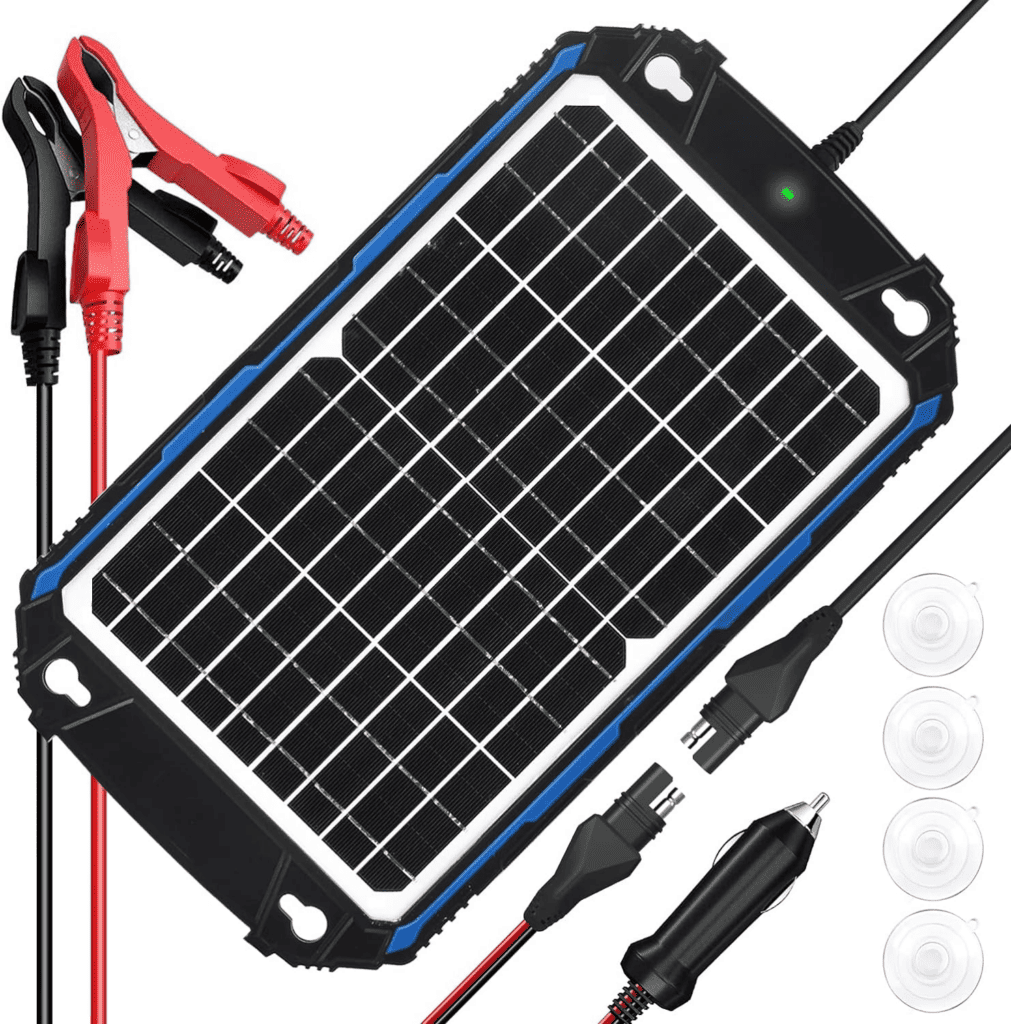
At a glance:
| Brand | SUNER POWER |
| Model | BC-12W-2 |
| Material | Crystalline silicon + Solar energy glass |
| Efficiency | 20% |
| Maximum Power | 12W |
| Dimensions | 13.2 x 10.3 x 0.51 inches |
| Weight | 4.89 pounds |
| Warranty | 1 Year |
Why we love it:
The SUNER POWER 12V solar trickle charger is a great choice for anyone who wants to keep their 12V batteries in good condition. It is perfect for use in all seasons and can be used to maintain batteries in a variety of applications, including cars, RVs, boats, and more.
The solar powered battery charger converts sunlight into 12 volt DC electricity, which is then transported to your batteries. This trickle charging method helps to prevent battery drain and extend the life of your batteries.
Moreover, this RV solar trickle charger is also designed to prevent overcharging and reverse discharge, which can damage your batteries. The built-in blocking diode ensures that your batteries will not drain even when the charger is not in use.
This SUNER POWER charger is a rugged and durable charger that is built to withstand the harshest conditions. It is made with high-quality materials, including 30% high-conversion efficiency crystalline silicon material and high-strength solar energy glass. This combination of materials ensures that the charger is both efficient and durable.
The charger also features a waterproof design that protects it from the elements. This makes it the perfect charger for use in any climate, even in the rain or snow.
Pros:
- Compact and portable
- Easy to use
- Multiple safety features
- Durable construction
- Good for maintaining batteries
- Affordable price
Cons:
- Slow charging: With only 10W of power, it takes a long time to fully charge a dead battery.
- Not suitable for deep discharge
- Short cables
- Limited compatibility
5. Sunway Solar 8W Battery Trickle Charger & Maintainer for RV
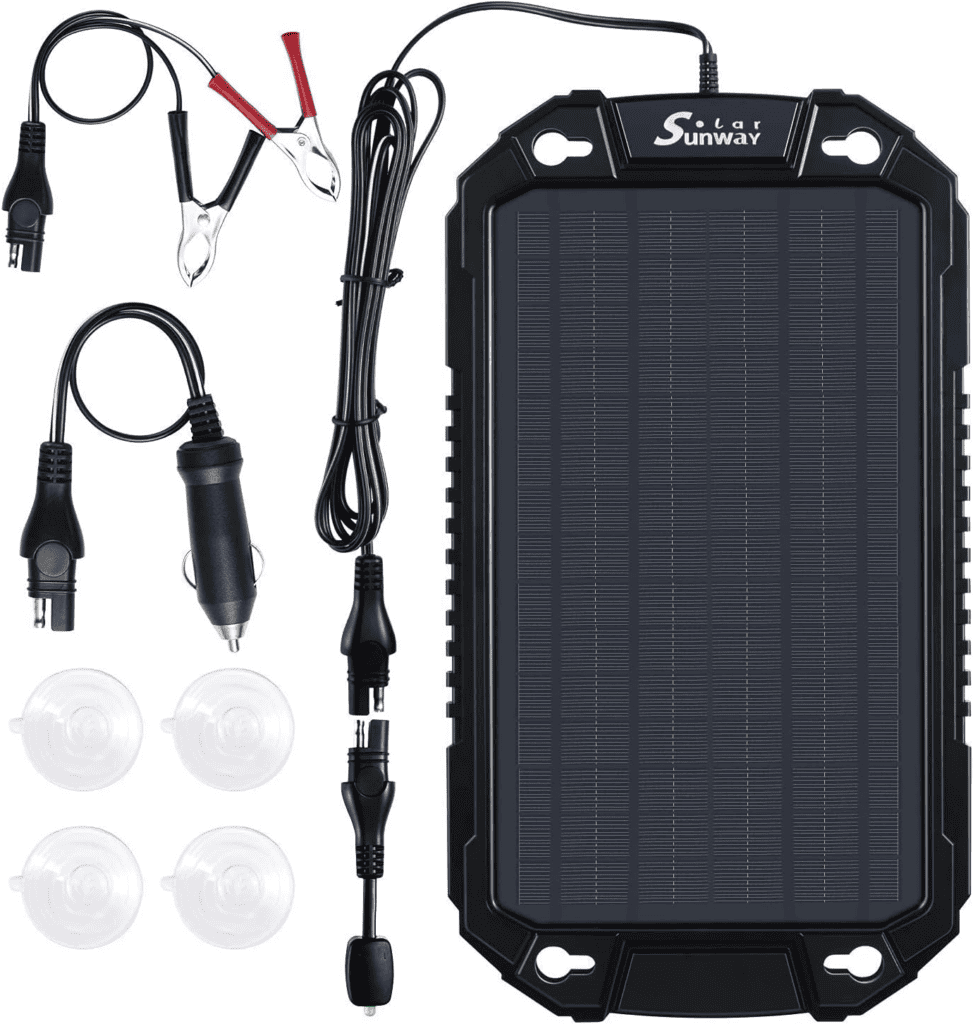
At a glance:
| Brand | Sunway Solar |
| Model | 8W |
| Solar Cell Type | Mono Crystalline |
| Maximum Power | 8W |
| Dimensions | 0.6 x 14.9 x 8.3 inches |
| Weight | 2.66 pounds |
| Warranty | 1 Year |
Why we love it:
The last charger we would like to recommend today is the Sunway Solar 8W charger, a versatile and durable solar charger for RV that can be used to trickle charge batteries in a variety of applications.
One of the best things about the RV solar battery charger is its easy and flexible installation. The suction cups included with the RV solar battery charger make it easy to mount the charger to the windshield or dash of your RV. The suction cups are also strong enough to hold the charger securely in place.
Coming equipped with a cigarette lighter plug, you can connect this battery charger to your RV’s 12 volt power system with ease. This is a great option if you want to be able to charge your batteries while you’re driving. The long cable gives you plenty of flexibility to position the charger where it gets the most sunlight. Alternatively, you can connect the charger to the battery using the crocodile clips provided. This gives you a variety of installation options to choose from, depending on your needs and preferences.
The Sunway trickle charger is covered with ultra clear PV glass, which makes it more efficient. It also has a durable ABS plastic housing that makes it more resistant to damage. Similar to the Sun Power charger, this solar battery charger also possesses a built-in diode that prevents reverse charging from batteries. It also has a 12volt LED charge indicator that lights up when the charger is working.
Pros:
- Affordable
- Flexible setups
- Durable construction
- Reverse discharge protection
Cons:
- Some complaints about missing accessories
- Some complaints on deformation after extensive outdoor exposure
How to Choose the Right RV Solar Battery Charger
Choosing the right solar panel to charge RV battery all depends on your power needs, for instance, whether you just need an solar battery charger to top off the RV battery to keep it healthy, or something as a primary power source for your power-hungry motorhome.
Solar Cell Efficiency
A crucial specification for an RV solar battery charger is the efficiency, expressed in percentage. It measures how much the energy in sunlight that an RV solar panel absorbs can be converted into usable electricity by the panel’s cells. A higher efficiency panel will generate more electricity from the same amount of sunlight, which is important for RVers who want to maximize their battery charging capabilities.
The higher the efficiency rating of a solar panel, the better it will do its job, and thus the fewer number of panels you will need to meet your rig’s power demand. The majority of solar panels on the current market have an efficiency rating of between 15% and 18%, with a few boasting slightly higher numbers.
This number is relatively low because, remember, the panels can only produce power from direct sunlight that hits its surface, not diffuse light or indirect sunlight that bounces off something.
Monocrystalline solar panels are typically the most efficient type of panel available. This is because they are made from a single crystal of silicon, which allows for a more uniform and efficient solar cell. Monocrystalline panels are also more durable than other types of panels, making them a good choice for RVers who want a long-lasting charger.
Polycrystalline solar panels are less efficient than monocrystalline panels, but they are also less expensive. They are made from multiple silicon crystals, which results in a less uniform solar cell. Polycrystalline panels are still a good option for RVers who are looking for an affordable charger.
Capacity
The capacity of an RV solar battery charger is the amount of energy it can store. This is measured in watt-hours (Wh). The capacity of a solar battery charger will determine how long it can power your RV’s appliances and devices.
The capacity of an RV solar battery charger will depend on a few factors, including:
- The size of the solar panels: The larger the solar panels, the more energy they can collect, and the more capacity the charger will have.
- The efficiency of the solar panels: More efficient solar panels can collect more energy from the sun, which will also increase the capacity of the charger.
- The type of battery: Different types of batteries have different capacities. For example, lead-acid batteries have a lower capacity than lithium-ion batteries.
- The number of batteries: The more batteries you have, the more capacity the charger need to have.
| Charger Type | Capacity (Wh) |
|---|---|
| Basic solar trickle charger | 10-100 Wh |
| Portable solar panel kit | 100-500 Wh |
| Full RV solar system | 1,000-10,000 Wh |
10-50 Watt Trickle Chargers: If you don’t boondock but just want a charger in place to maintain the charge in your battery, and one that charges it steadily at minimal current at that, you only need a 10 to 50 Watt solar battery charger. A 10 watt solar charger is sufficient to maintain the optimum level of charge in your RV’s 12 volt battery.
Although all three types of solar charging systems – tenders, portable kits and built-in systems – can trickle charge your RV battery, getting something larger than you really need means you’re getting little value for your investment, since the price of a camper solar battery charger increases with its power generating capacity.
50-100 Watt Chargers – Light Use: These small solar systems can charge the battery during the day and provide power during the night for light uses of small electronics, cellphones, and energy-efficient LED lights. These systems are not powerful enough to run fridges, computers, TVs and A/C or heaters. In short, they are most suitable for the small and minimal Class B minivans.
100-600 Watt Chargers – Medium Use: If you wish to power TVs, computers, fridges, ovens or cooling/heating systems, you will need at least a medium-size solar battery charger for RV that is capable of at least 100 Watt. The general rule of thumb is that if you own anything other than a Class B minivan, you would need at least two 100-watt panels, or 200 watts in total. 100-watt panels are the most common or standard size for solar battery charger these days, that is why campers usually ask questions like “how many 100W panels do I need for my power demand?”
Note that for light AC applications like running the TVs or PCs, you will need an inverter. Depending on your power needs and whether you tend to run many appliances at one time, you might need to pair your solar charger with a generator as a backup, which is commonly done. The solar system will significantly lessen the load on the generator should you need it.
600-4000 Watt Chargers – Heavy Use: If you tend to power many appliances at the same time, or if you own a big Class A or Class C motorhome fully equipped with a lot of amenities, you will need a heavy duty RV solar battery charger that is capable of up to 4,000 Watt. A rule of thumb is for boondockers who tend to take long off-grid stays, you would need a system capable of 1,800 watts or more.
Such a powerful system will allow you to operate everything you need, including the air conditioner, without the need for a generator. Unlike the smaller chargers, these heavy-use solar systems always include an inverter for AC applications. Accordingly, they are ideal for boondockers who like to stay in the wilderness for long periods at a time.
RV Battery’s Capacity
When choosing a solar charger for your RV battery, it is important to consider the battery’s capacity. While the above section provides you a rough guide, you can calculate the minimum wattage that your solar battery charger would need to charge your RV battery, based on the battery’s total capacity.
The capacity of an RV battery is measured in amp-hours (Ah). This is the amount of current the battery can deliver for 20 hours at a usable voltage (10.5 volts or higher). To calculate the minimum wattage of a solar battery charger you need, divide the battery’s amp-hour rating by 20.
The capacity of a 12 volt battery is measured by amp-hour rating, that is the number of amps of power the battery can deliver at usable current (defined as 10.5 volts or higher) for 20 hours of total available use.
For instance, an RV battery is rated at 100AH or amp-hour. Divide this number by 20 (that is the standard 20 hours of total available use, or any other number specified by the manufacturer), you get a capacity of 5 amps per hour. Assuming we are charging this battery at 12 volts and 5 amps, your would need a solar charger capable of at least 12 volts * 5 amps = 60 watts. To be safe, you should get one 100 watt panel or above.
* More on choosing the right size of solar panels for your needs:
If you wish to be more exact, the surest way to choose the right size of RV solar battery charger is to add up the electrical loads of all the appliances that you would likely run at the same time, then get a system that can at least accommodate that power demand.
A general guide is a 100 watt panel, which is the most common these days, can generate about 6 amps per hour of peak sun, which translates to around 30 ampere hours every day. Meanwhile, if you’re boondocking, you would need at least 80 ampere hours per day.
You can find the voltage and current demands of an appliance on its nameplate. For instance, most RV fridges on the market are rated for between 1 amp and 6 amps per hour. Multiply this number by 24 hours and the appliance’s operating cycle, expressed as a percentage, and you will get the ampere hours.
For example, if a fridge pulls 6 amps per hour and has a 40-percent cycle, its daily power consumption will be 6 amps x 24 hours x 40% = 57.6 ampere hour per day.
RV Battery Type
The best solar powered charger for your RV also depends on the type of battery you have. Lead acid batteries and lithium batteries have different charging requirements, so you’ll need to choose a charger that is compatible with your battery type.
Lead Acid Batteries: Lead acid batteries, including flooded, get and AGM batteries, should not be made to withstand deep discharges, or else their lifespan will be shortened. It is important to charge your lead acid batteries daily if you don’t want them to suffer a premature death.
For this reason, if your RV comes with this type of battery, you will need a large size solar system, since a small size system would charge the batteries too slowly. In most cases, RVers who like to boondock from time to time would pair their solar battery charger with a generator to ensure sufficient charging capacity.
Lithium Batteries: Although lithium batteries cost much more than the lead acid type, they last longer, do not need to be recharged everyday and can withstand deeper discharges without sustaining damages. As such, you might not need a generator as a backup plan, and depending on your power need, you might be able to get a smaller size RV solar battery charger.
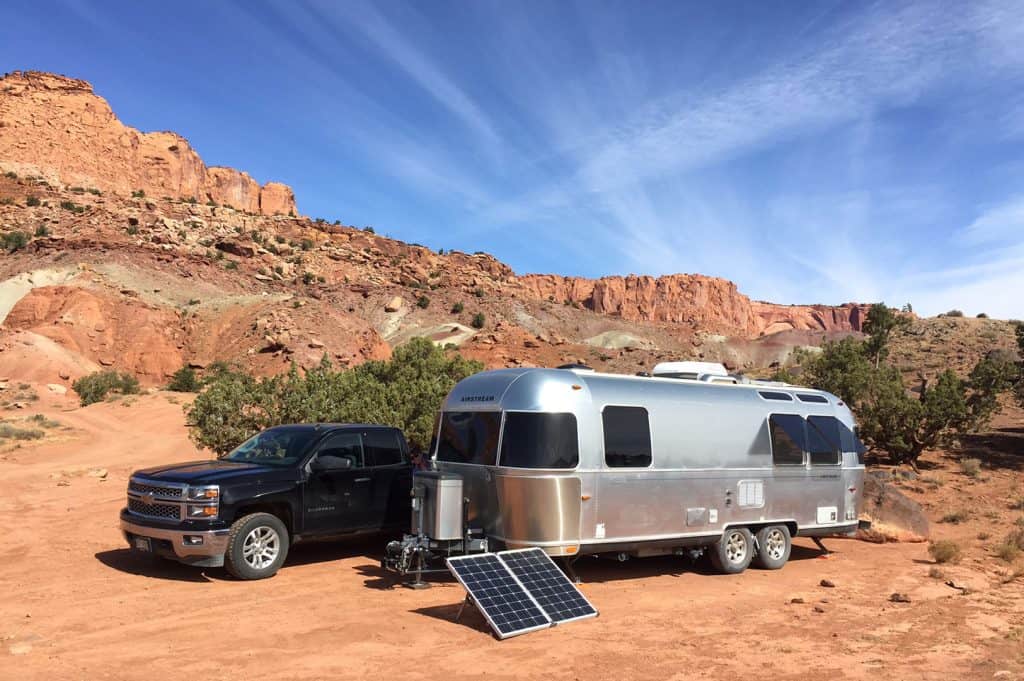
Cost
The cost of an RV solar battery charger can vary widely based on several factors, including the type of system, the capacity of the panels.
Solar trickle chargers
Basic solar trickle chargers are a great option for RVers who want to keep their batteries topped up without breaking the bank. They are typically very affordable, starting at just $20 to $50. However, they also tend to be less powerful, making them suitable for smaller RVs or batteries.
If you have a larger RV or need more power, you may want to consider a higher capacity solar trickle charger. These models typically range in price from $50 to $150 and provide slightly more wattage. They are suitable for larger RVs, boats, or other vehicles with bigger batteries.
Portable solar panel kits
Portable solar panel kits are a great option for RVers who want a more powerful and versatile way to charge their batteries. They typically range in price from $100 to $800, depending on the size and wattage of the panels, as well as the features included.
Entry-level portable kits with lower capacity panels can start at around $100 to $300. These kits are a good option for RVers who want to be able to charge their batteries while boondocking or camping in remote areas. However, they may not be powerful enough to charge larger RVs or batteries.
More powerful and versatile kits with higher wattage panels might range from $300 to $800 or more. These kits are a good option for RVers who want to be able to charge their batteries quickly and efficiently, even in overcast weather. They also typically come with additional features, such as built-in battery chargers and USB ports.
Full RV solar systems
A full-scale RV solar system can cost anywhere from $2,000 to $10,000 or more, depending on the size and quality of its components. The system typically includes multiple roof-mounted solar panels, a charge controller, a battery bank, and possibly an inverter.
Premium systems with higher capacities and advanced features will be on the higher end of this range. For instance, a system with 500 watts of solar panels, a 2,000 amp-hour battery bank, and a 2,000 watt inverter could cost around $5,000. A system with 1,000 watts of solar panels, a 4,000 amp-hour battery bank, and a 4,000 watt inverter could cost around $10,000.
Weight & Size
Solar chargers can range in weight from a few pounds to several hundred pounds, and in size from small, portable units to large, roof-mounted units. Depending on your camping setup, you should choose the solar charger with suitable size and weight.
- If you have a small RV or limited space, you will need to choose a lightweight and compact charger. This will make it easier to transport the charger and store it in your RV.
- If you plan on boondocking or camping in remote areas, you will need a portable charger that is easy to set up. This will allow you to quickly and easily get your batteries charged up when you are in the middle of nowhere.
- If you have a large RV or need to power a lot of appliances and devices, you will need a more powerful charger that is larger and heavier. This will ensure that your batteries are able to keep up with the demand for power.
FAQs About RV Solar Battery Chargers
How long does it take for a 100W solar charger to fully charge a 12 volt battery?
The exact answer to this question depends on the type of battery, the ambient temperature, and panel and charger efficiency. A 100 watt solar battery charger can take anywhere between 5 hours and 17 hours to restore a 12 volt RV battery to a full charge. An example of the basic math is as follows:
Assume you have a 12-volt 100AH battery. You drain the battery down to 60%, which means you have consumed 40% of 100AH, or: 40% * 100AH = 40 amp-hour that particular day.
Assume you have one 100 watt panel. This panel produces about 6 amps per hour during peak sun. 6 amps of current from the solar charger delivers a charge of 6 amp-hour every hour, so to make up for the 40 amp-hour that you consumed that day, it would take the 100 watt solar panel: 40AH / 6A = 6.67 hours to charge the battery up to 100%.
How many 100W solar panels do I need to charge a 12 volt RV battery?
This depends on many factors, including the capacity of your RV battery and the efficiency of your solar battery charger. The capacity of your RV battery is measured by its Ampere Hour rating, which can be found on its nameplate. For instance, a battery is rated for 200AH or 200 amp-hour of power per day. This number is based on the standard 20 hours of available use. Divide 200 amp-hour by 20 hours, we get the amp rating of the battery, which is 10 amps.
We need to charge this battery at 12 volts and 10 amps, which means you need at least: 12 volts * 10 amps = 120 watts worth of solar panels to properly charge this battery. The rule is to always go up to provide some safety room, so you should get two 100W solar panels.
How much does a 100W solar panel cost?
A standalone 100W solar panel now costs around $100, and you can find models that cost less than $100. That’s for one panel alone. If you want a complete all-in-one kit for the most pain-free installation, it would set you back by $300 and above.
What is reverse discharge protection in a solar panel?
Reverse discharge refers to the instances where the electricity that the solar panels produce go back to where it came. The best camper solar battery chargers on the market usually boast a blocking diode to prevent reverse discharge and make sure that electricity flows from high voltage to low voltage, that is from the solar panel to the batteries that need to be topped off.
Can I directly charge electronics using solar chargers?
Yes, you can, if your solar kit includes USB ports that allow you to directly connect to electronics like mobile phones and laptops. Make sure you consult your owner’s manual first.
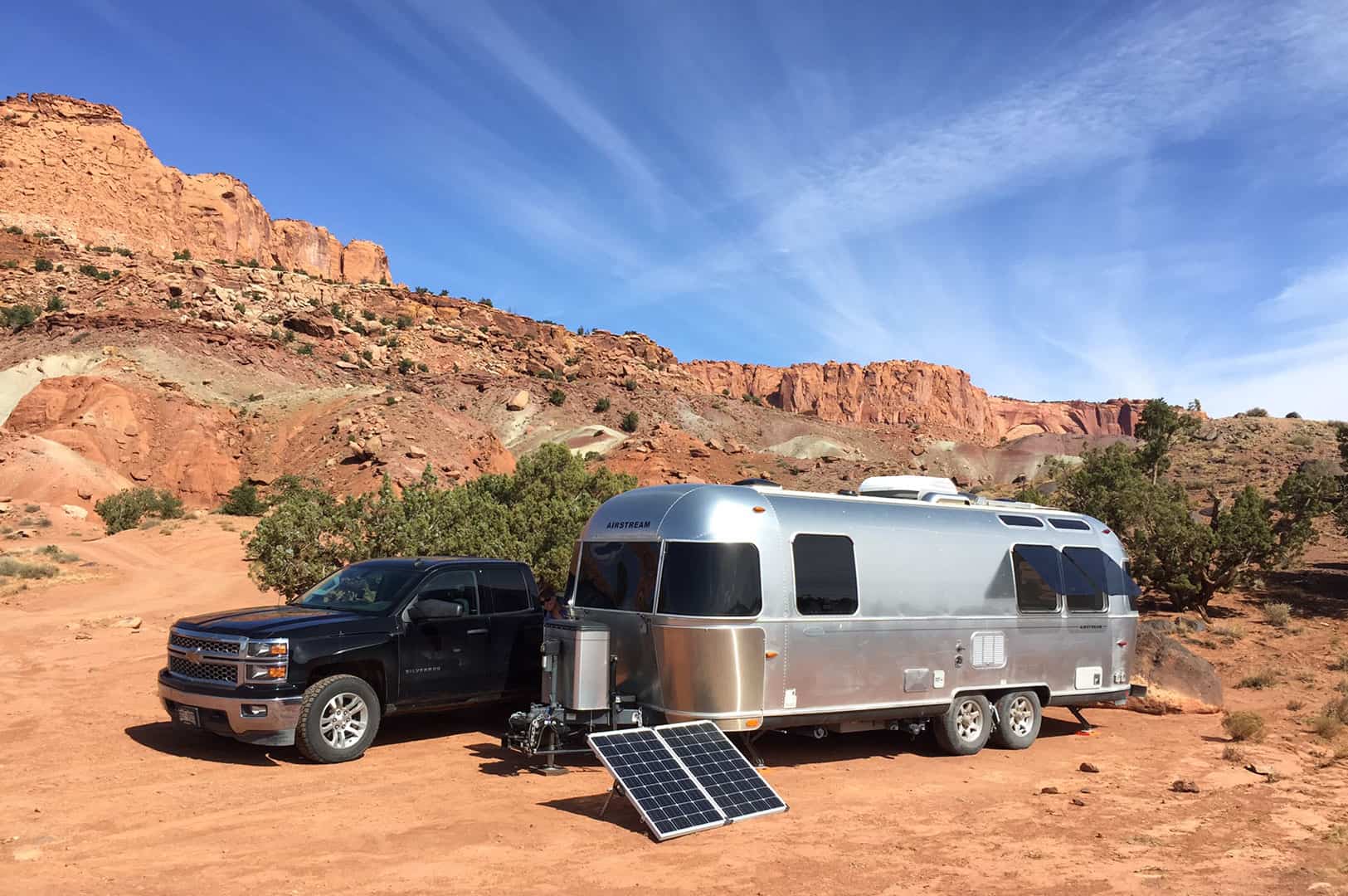

Fixed roof solar systems don’t need to cost anywhere near $2,000-$10,000 unless you are using it with an inverter to power AC systems. for those of us that like to boondock, simple roof mounted systems can be had for under $400 that include 200 watts of panels, wiring, charge controllers, and mounting brackets. Coupled with a lithium battery, we can go for days, with them only limit being our black tank capacity